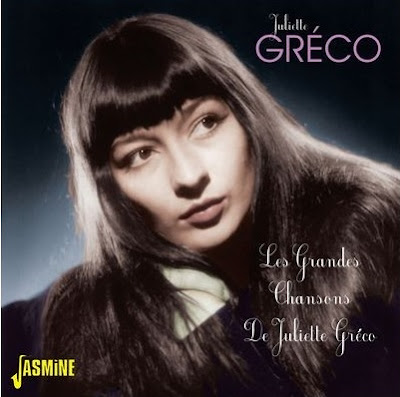Juliette Gréco ( 7 February 1927 – 23 September 2020) was a French singer and actress and an icon of post-Second World War French bohemianism.
Juliette Gréco was born in Montpellier, France, the youngest of two daughters to Gérard Gréco, a Corsican policeman, and Juliette Gréco, née Lafeychine. The pair separated, and Gréco and her sister Charlotte were brought up in part by their maternal grand-parents in Bordeaux. Gréco was twelve when the war began in Europe, and both her mother and her sister survived Nazi prison camps following their involvement in the French Resistance. Gréco, too, was imprisoned for several months, and it was likely during this time she developed an oppositionist stance that never left her.
With the help of a family friend, the actress Hélène Duc, she took drama lessons while working as a sort of combination hostess and bouncer at Le Tabou, a jazz club in the heart of St.-Germain-des-Prés, the Left Bank neighborhood that had become the city’s center of bohemian life. During this time her habit of wearing men’s clothes, including rolled-up pants, was necessitated by poverty and made possible by the hand-me-downs of male friends who lived in the same pension. The style caught on. Though she had yet to garner attention as an actress, her distinctive look got the attention of leading French photographers, who took and published pictures of her.
Gréco began singing in cabaret in 1949, after she was offered a job helping organise the first show at the newly reopened Le Bœuf Sur le Toit cabaret club. That was the beginning. The first song she recorded, “Je Suis Comme Je Suis,” was released in 1951. Her first album, “ Chante Ses Derniers Succès,” appeared the next year. But her star-defining triumph was her 1954 concert at Olympia Hall in Paris, after a tour of the United States and South America. During the performance she introduced “Je Hais les Dimanches” (“I Hate Sundays”), a new number by a young songwriter, Charles Aznavour.
She had made her film debut even before her singing career began, as a nun in “Les Frères Bouquinquant,” a 1948 drama. She went on to appear in almost 30 films, mostly in the 1950s and ’60s. They included Jean Cocteau’s “Orphée” (1950), as Aglaonice, an astronomer-witch; “The Sun Also Rises” (1957), an American adaptation of Hemingway’s novel, with Tyrone Power and Ava Gardner; “The Roots of Heaven” (1958), a drama set in Africa, in which she starred opposite Errol Flynn; and “Crack in the Mirror” (1960), with Orson Welles. She also made a lasting impression in a 1965 French mini-series, “Belphegor, Phantom of the Louvre.” When it was made into a feature film in 2001, she was cast in a small role as a tribute to her influence.
1n 1953, Ms. Gréco married the actor Philippe Lemaire; they divorced in 1956. Their daughter, Laurence-Marie Lemaire, died in 2016. She was married to the French actor Michel Piccoli from 1966 until their divorce in 1977. She was with the pianist and composer Gérard Jouannest, her third husband, from 1988 until his death in 2018.Her longest and best-known romantic relationship may have been with Miles Davis, the celebrated jazz trumpeter, whom she met when he was appearing in Paris in 1949. Sartre reportedly once asked him why he and Ms. Gréco were not married. According to Ms. Gréco, Mr. Davis replied, “I love her too much to make her unhappy.”In 2014, Ms. Gréco told The Guardian, “We saw each other regularly until his death” in 1991.
After 1970, Gréco became an emblem of what seemed a lost era. She was the last of the great chanteuses, and she toured the world with a constantly changing repertory of songs. They had usually been written for her, and when she sang them her control and concentration was that not only of a great singing actor, but of a survivor. In the 90s she became president of the association to preserve Saint-Germain-des-Prés, the area which, she quipped, had “turned me into a marketable commodity”.
Gréco’s final acting role was in Jedermanns Fest (2002), though she also appeared in a documentary, Dans les Pas de Marie Curie (2011). She wrote two autobiographies; Jujube (2002) and Je suis faite comme ca (2012). In France, she was made a Commander of the Legion of Honour in 2012; she received the National Order of Merit in 2015, and was made a Commander of the Order of Arts and Letters a year later.
(Edited from The New York Times & The Guardian)








